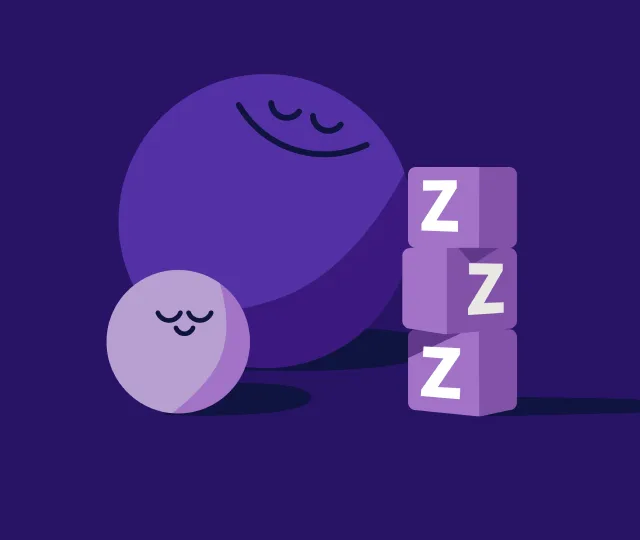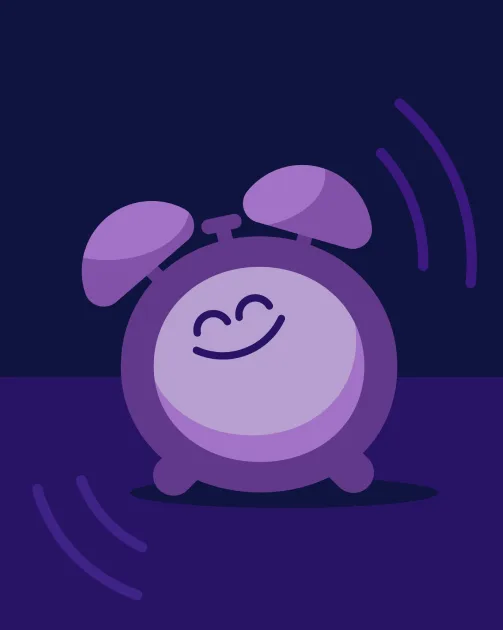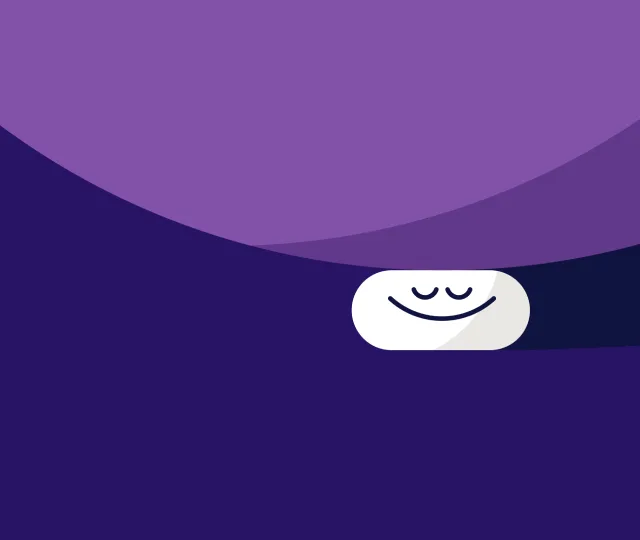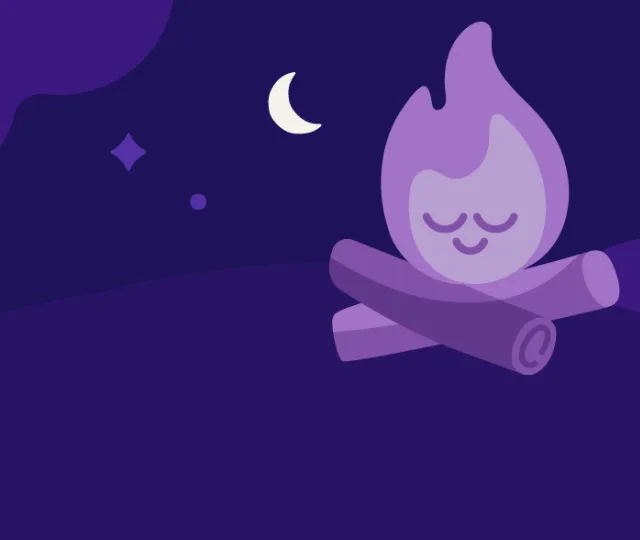How to sleep better
By Your Headspace Mindfulness & Meditation Experts
Mar 2, 2021
15 science-backed tips
Good sleep is a foundation for good health and a happier frame of mind. But when was the last time you woke up feeling refreshed, alert, and hopeful — ready to take on the day? Or, fell asleep easily without worry or effort?
Ready to get better sleep?
Start your free trial
Wind down for a restful night’s sleep
Try this simple visualization to soothe the mind and relax the body, creating the ideal sleep conditions.

Switching Off
2 mins
If you're nodding after reading those questions, know you're not alone. These issues affect many of us.
According to research, almost a third of us drag ourselves out of bed in the morning because we haven’t gotten enough good-quality sleep at night, which means we’re not feeling as great as we could be during the day.
Do you need to get better sleep?
If you’re waking up tired and fuzzy-headed, it can be harder to remember things, like where you left the keys when you’re rushing to get out the door, or maybe at work, you don’t feel as focused or productive as you could be.
Being tired also throws your hunger hormones out of whack — a sleepy brain loses executive function, so it’s harder to make healthy food choices. What that means is, when you hit a wall late in the afternoon, you’re more apt to grab a candy bar, a bag of chips, or other sugary or salty snacks that would not get a nutritionist’s stamp of approval.
Not surprisingly, by the time you get home you may be feeling irritable or cranky, and a little wound up. Not the best state of mind for peacefully drifting off a few hours later.
To feel your best during the day, you need to sleep well at night. Unfortunately, there’s no magic wand you can wave to make that happen. But there are some simple steps you can take to help you sleep better - here are 15 things to consider if you want to get better sleep.
5 tips to create a restful environment for a good night’s sleep
Your bedroom should feel like a sleep oasis — stress and distraction-free. While creating the right environment is, to a certain extent, a matter of personal preference, sleep experts offer these sleep hygiene suggestions that are backed by science.
1. The ideal room for sleep is cool and dark.
Most experts agree that the sweet spot for temperature is between 60 and 67 degrees Fahrenheit. According to a National Sleep Foundation poll, 73% of Americans say the darker the room the better. 65% of people use shades, curtains, or blinds to block unwanted light.
2. Peace and quiet make for bedroom bliss.
74% percent of Americans think that quiet is crucial for getting good sleep. That said, many people rely on “white noise” or some type of ambient sound to help mask disruptive noises like car horns or highway traffic. You can also use a fan (which will do double duty, keeping your room cool) or try one of the many soothing sleepcasts or some sleep music from the Sleep experience in the Headspace app. Sleepcasts run about 45 minutes and can help create a relaxing, peaceful environment for sleep. Help create an environment that's conducive for a restful night's sleep — sign up and start using the Headspace app.
3. Choose the bedding (and sleep position) that’s best for you.
A comfortable mattress and pillows are essential for good sleep, but whether they’re soft or firm is up to you. The pillow you choose may depend on your preferred sleep position. If you’re a side sleeper (as most people are), your pillow should comfortably support your head, neck, and ear as well as your shoulder. People who sleep on their backs should consider a thinner pillow to limit stress on the neck.
4. Declutter your bedroom.
If your bed feels dreamy but your room is a mess, you could be at a higher risk for sleep problems. A study presented at the June 2015 SLEEP conference in Seattle suggests that those surrounded by clutter were more likely to have a sleep disorder. What your eyes see when you walk into a room can influence whether or not you’ll have an easy time falling asleep. So, as many of our parents used to say, clean up your room!
5. Pick the perfect pillow for you.
Pillow fill is important to consider if you suffer from allergies. Fills vary from natural choices like feathers to synthetics like rayon, foam, or latex. Look for pillows that are hypoallergenic to lessen the chance of nighttime congestion and sniffles that can keep you awake.
5 ways to wind down for better sleep at the end of your day
Especially after a busy day, it’s important to allow time in the evening to decompress and unwind before heading to bed. That doesn’t mean turning your home into a silent retreat. Just a few small changes can awaken your senses and calm your busy mind, easing the transition from daytime to night.
1. Music can soothe us.
Rather than listening to the news — or the chatter in your head/mind — when you get home, put on your favorite music. While classical music has been shown to lower blood pressure and reduce stress, any music that you enjoy will help you quiet down and lift your mood. If you’re looking for some sounds that are specially designed to soothe, check out Headspace’s sleep music and sleepcasts.
2. Dim the lights when you’re home at night.
Instead of switching on a bright overhead light, think about lamps, a dimmer switch, or candles to create a more serene setting. In addition to being more low key, indirect light is less disruptive the body’s natural circadian rhythms.
3. Consider limiting caffeine and alcohol later in the day.
Part of the winding down process at night actually begins during the day. It includes exercising early, limiting caffeine — coffee, tea, and soda — after lunch, avoiding foods that might upset your stomach, and perhaps skipping happy hour, since alcohol too late in the day can diminish sleep quality.
4. Expose yourself to natural light (outdoors, if possible) in the morning or earlier in the day.
Getting enough natural light during the day will also keep your body clock on a healthy sleep-wake cycle.
5. Ramp down evening emails.
Try not to read (or send) work emails after dinner. According to a 2018 study out of Virginia Tech, the mere expectation of checking work email after hours can cause anxiety and stress. Each new message represents another decision you have to make, keeping your mind active (and taking away from social time, family time or alone time). The study recommends practicing mindfulness to help you unwind and keep you present for social, family or solo activities.

5 suggestions to help you de-stress and sleep better
What keeps you up at night? More often than not, it’s an active mind caught up in worry and anxiety, agitation, or even sadness. Here are a few ways to de-stress so you can drift off to sleep more easily.
1. Try some gentle yoga poses before bedtime.
According to a survey by The National Center for Complementary and Integrative Health, more than 85% of those who practiced yoga reported reduced stress and 55% reported better sleep. These 7 restorative yoga poses before bed have been shown to increase relaxation and relieve tension.
2. Start a gratitude list each day.
Many studies suggest a connection between gratitude and feelings of wellbeing. Practicing gratitude can have many positive effects on our lives including lowering blood pressure, reducing risks of depression and anxiety, and setting the right conditions for better sleep, according to Robert A. Emmons, professor of psychology at UC Davis and a leading scientific expert on the science of gratitude. Consider keeping a gratitude journal, writing down a few things you’re thankful for a few times per week. There’s no right or wrong way to do this, but here are a few tips to get you started.
3. Bathe before bedtime.
Taking a warm bath or shower an hour or two before bed has been shown to relax both the body and mind, in one study lowering both heart rate and blood pressure. Heat relaxes tense, tired muscles, and helps you de-stress.
4. Read yourself a bedtime story (in book form).
Reading is a great way to relax. Even just six minutes absorbed in a story can reduce stress by 68%, according to research from the University of Sussex. The cognitive neuropsychologist who conducted the test, Dr. David Lewis, described getting lost in a good book as “the ultimate relaxation … you can escape from the worries and stresses of the everyday world...” Best case scenario, it’s a book — you know, those hardcover or paperback volumes with the pages sewn together — not a Kindle, iPad, or other backlit devices. If you don’t have a book at the moment, try listening to one of the sleepcasts from Headspace. Choose from a series of descriptive narrations, where soothing voices guide you through relaxing, dreamy landscapes — allowing you to unwind and power down gently.
5. Get some Headspace.
One of the inspirations behind the launch of Sleep by Headspace was that many Headspace members said they practiced meditation in the evening, including before bed, to help them de-stress and fall asleep. While meditation is not about clearing away or stopping thoughts, it is about learning to be more at ease with your thoughts and more compassionate to yourself and others. In this way, mindful meditation can reduce stress, and help pave the way for good night’s rest.


Sleep made simple
- Find your perfect bedtime routine with hours of relaxing music, sounds, and stories to choose from
- Get more restful sleep with our Sleep Health course: exercises developed with leading sleep scientists
- Feel your best from morning to bedtime with access to hundreds of stress-relieving meditations
Annual - billed at $69.99 USD/yr
14 days free
$5.83 USD/month
Monthly
7 days free
$12.99 USD/month


Stay in the loop
Be the first to get updates on our latest content, special offers, and new features.
By signing up, you’re agreeing to receive marketing emails from Headspace. You can unsubscribe at any time. For more details, check out our Privacy Policy.
- © 2025 Headspace Inc.
- Terms & conditions
- Privacy policy
- Consumer Health Data
- Your privacy choices
- CA Privacy Notice







